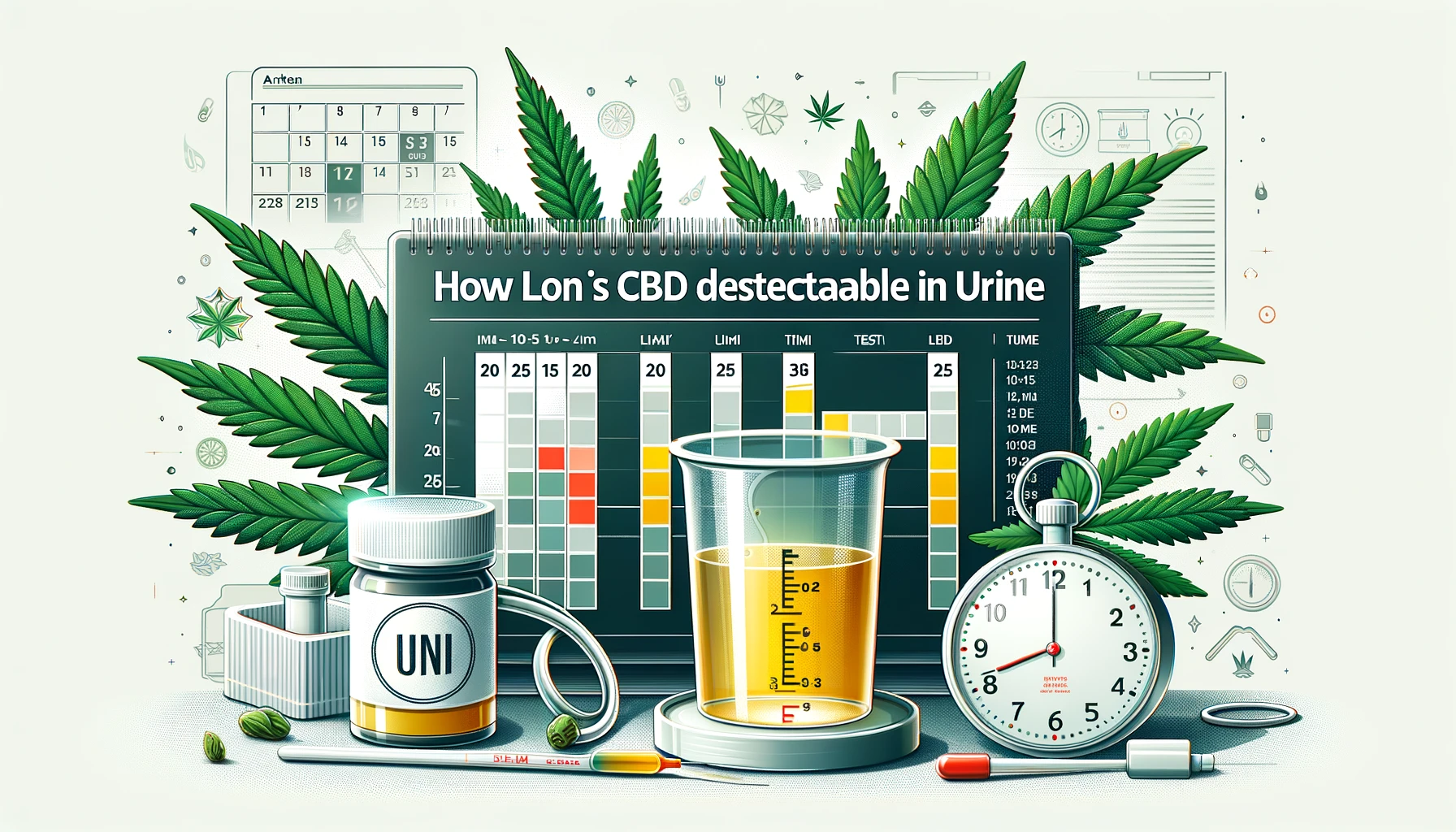Cannabidiol (CBD), a compound found in cannabis plants, has gained immense popularity in recent years for its potential health benefits. With its widespread use, a crucial question arises for individuals undergoing drug screenings, either for employment, competitive sports, or legal reasons: how long is CBD detectable in urine? This article delves into the intricacies of CBD, its detectability in urine tests, and the various factors influencing its presence in the body.
Background on CBD
Defining Cannabidiol (CBD)
CBD is one of over a hundred cannabinoids found in cannabis plants, known for its non-psychoactive properties. Unlike THC (Tetrahydrocannabinol), the component that causes psychoactive effects or a ‘high,’ CBD is reputed for its potential therapeutic benefits. These include pain relief, anxiety reduction, and aiding in sleep disorders, making it a popular choice for those seeking alternative treatments.
Sources and Forms of CBD
Extracted primarily from hemp, a cannabis plant variety with low THC levels, CBD is available in several forms. These include oils and tinctures, edibles like gummies and chocolates, capsules, topical creams and balms, and vaping products. Each form offers different bioavailability and absorption rates, which affect how CBD is metabolized and eliminated from the body.
Legal Status of CBD Globally
The legal landscape of CBD is complex and varies significantly across countries. In some regions, CBD is fully legal and available over the counter in health stores and online. However, in other countries, it remains a controlled substance with strict regulations. This discrepancy affects the quality, availability, and consumer trust in CBD products.
Urine Testing for CBD
CBD testing in urine is not as common as testing for THC, the psychoactive compound in cannabis. However, certain circumstances may necessitate testing for CBD, especially in environments where drug use is strictly monitored. These include workplaces with stringent drug policies, athletes subject to anti-doping regulations, and individuals involved in legal proceedings where substance use may be a factor.
Determinants of CBD Detection in Urine
The presence of CBD in urine and the duration it remains detectable can vary widely depending on several factors:
- Body Weight and Metabolism: Individuals with higher body mass or a faster metabolism may process and eliminate CBD more rapidly from their system.
- Dosage and Frequency: Regular usage or higher doses of CBD can lead to longer detection times in urine. This is due to the potential buildup of CBD in the body’s fat cells, from where it is slowly released and metabolized.
- Type of CBD Product: The specific CBD product used can influence detectability. For instance, products with higher THC content, even if within legal limits, might result in longer detection times.
- Purity of the Product: The presence of other compounds, contaminants, or varying levels of CBD concentration in products can also impact how long CBD is detectable in urine.
Detection Windows for CBD in Urine
CBD’s detection window in urine is not precisely defined and can range considerably. For occasional users, CBD might be detectable for 2-5 days after use. In contrast, for chronic or heavy users, CBD could remain detectable for weeks. This variability largely depends on the factors mentioned earlier, such as dosage, frequency of use, and individual metabolic differences.
Research and Studies on CBD Detection
Research into how CBD is metabolized and excreted is ongoing. Studies suggest that CBD’s half-life, the time it takes for half of the drug to be eliminated from the body, ranges from 18 to 32 hours. However, these findings are not definitive. The limitations of current research include small sample sizes, varying methodologies, and a focus on specific populations, making it challenging to generalize findings.
Legal and Ethical Aspects of Urine Testing for CBD
The legal implications of testing positive for CBD in urine are complex and depend on regional laws. In areas where CBD is legal, a positive test might not have legal repercussions. However, the situation is different where CBD is restricted or illegal. Ethically, the use of urine tests for CBD raises questions about privacy, especially considering the medicinal use of CBD. Employers, healthcare providers, and legal entities must navigate these ethical dilemmas, balancing the need for drug monitoring with respect for individual rights.
FAQs on CBD Detection in Urine
- Can CBD be mistaken for THC in urine tests?
- Quality tests are designed to differentiate between CBD and THC. However, some lower-quality tests may not be as precise, leading to false positives, especially if the CBD product contains trace amounts of THC.
- How long should I stop using CBD before a drug test?
- It is advisable to stop using CBD at least a week before a scheduled drug test. For heavy or regular users, a longer abstinence period may be necessary to ensure the body has adequately eliminated CBD.
- Can I test positive if I use CBD topicals?
- The likelihood of testing positive from using CBD topicals is lower than with other forms, as the skin has a limited absorption rate. However, it is not entirely impossible, particularly with products that have higher THC levels.
Guidance for CBD Users
For those concerned about CBD detection in urine, careful consideration of the type and purity of CBD products is vital. Opting for high-quality, third-party tested products with clear labeling of CBD and THC content is recommended. Additionally, understanding one’s dosage and frequency of use can help manage the risk of a positive urine test.
Conclusion
The detectability of CBD in urine is a multifaceted issue, influenced by individual physiology, product choices, and usage patterns. As the legal and social landscape surrounding CBD continues to evolve, users should remain informed and exercise caution, particularly if they are subject to drug testing.
References and Additional Resources
For a deeper understanding of CBD and its implications, consulting current scientific research, legal guidelines, and expert opinions is recommended. Staying informed is essential for responsible and safe CBD use.

Meet the CBDOilWow Editorial Team, a collective of CBD experts dedicated to unraveling the world of cannabidiol. With a passion for wellness and a commitment to providing the latest insights, they serve as your trusted guides in exploring the potential of CBD, ensuring you make informed choices for a healthier, more balanced life.

Leave a Reply